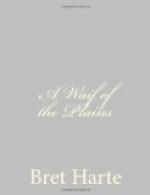in his young kinsman’s hands. Again, by
one of those illogical sequences which make a lifelong
reputation depend upon a single trivial act, Clarence’s
social status was settled forever at El Refugio Rancho
by his picturesque diversion of Flynn’s parting
gift. The grateful peon to whom the boy had scornfully
tossed the coin repeated the act, gesture, and spirit
of the scene to his companion, and Don Juan’s
unknown and youthful relation was at once recognized
as hijo de la familia, and undeniably a hidalgo born
and bred. But in the more vivid imagination of
feminine El Refugio the incident reached its highest
poetic form. “It is true, Mother of God,”
said Chucha of the Mill; “it was Domingo who
himself relates it as it were the Creed. When
the American escort had arrived with the young gentleman,
this escort, look you, being not of the same quality,
he is departing again without a word of permission.
Comes to him at this moment my little hidalgo.
’You have yourself forgotten to take from me
your demission,’ he said. This escort,
thinking to make his peace with a mere muchacho, gives
to him a gold piece of twenty pesos. The little
hidalgo has taken it
so, and with the words,
’Ah! you would make of me your almoner to my
cousin’s people,’ has given it at the
moment to Domingo, and with a grace and fire admirable.”
But it is certain that Clarence’s singular simplicity
and truthfulness, a faculty of being picturesquely
indolent in a way that suggested a dreamy abstraction
of mind rather than any vulgar tendency to bodily
ease and comfort, and possibly the fact that he was
a good horseman, made him a popular hero at El Refugio.
At the end of three years Don Juan found that this
inexperienced and apparently idle boy of fourteen
knew more of the practical ruling of the rancho than
he did himself; also that this unlettered young rustic
had devoured nearly all the books in his library with
boyish recklessness of digestion. He found, too,
that in spite of his singular independence of action,
Clarence was possessed of an invincible loyalty of
principle, and that, asking no sentimental affection,
and indeed yielding none, he was, without presuming
on his relationship, devoted to his cousin’s
interest. It seemed that from being a glancing
ray of sunshine in the house, evasive but never obtrusive,
he had become a daily necessity of comfort and security
to his benefactor.
Clarence was, however, astonished, when, one morning,
Don Juan, with the same embarrassed manner he had
shown at their first meeting, suddenly asked him,
“what business he expected to follow.”
It seemed the more singular, as the speaker, like
most abstracted men, had hitherto always studiously
ignored the future, in their daily intercourse.
Yet this might have been either the habit of security
or the caution of doubt. Whatever it was, it
was some sudden disturbance of Don Juan’s equanimity,
as disconcerting to himself as it was to Clarence.
So conscious was the boy of this that, without replying
to his cousin’s question, but striving in vain
to recall some delinquency of his own, he asked, with
his usual boyish directness—




